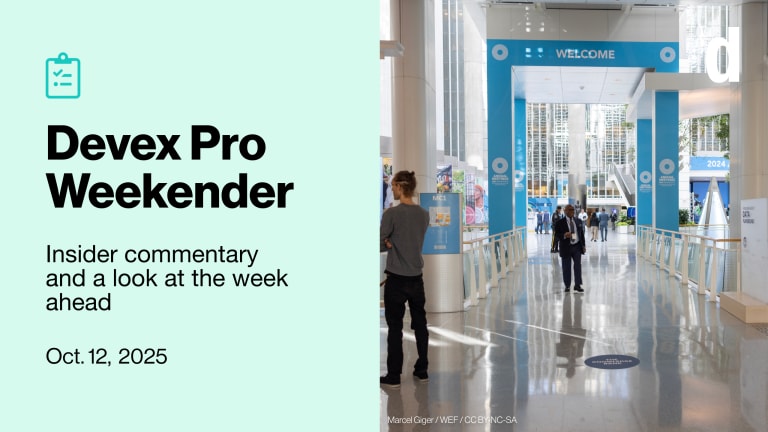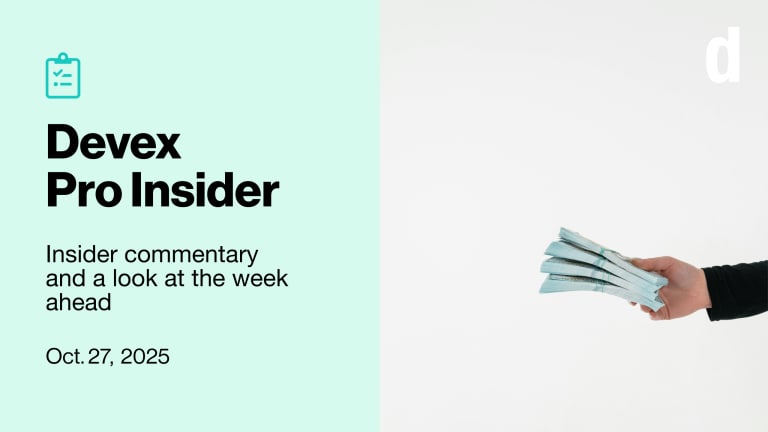Devex Pro Insider: What we learned at the World Bank meetings
The world’s financial leaders gathered in Washington for the World Bank-IMF annual meetings, and they talked for a long time. The next question is whether the talk leads to tangible results.
So, that was the World Bank annual meetings. The great and the good among the world’s financial leaders gathered in Washington, and they talked for a long time, and they went away. The next question is whether the talk leads to tangible results. Ajay Banga continued to push his priorities — reform and jobs — and unveiled some new staffing structures. Relatively little progress appears to be likely on key issues such as debt restructuring, climate finance, and tax reform. Uncertainty is the new normal. The European Investment Bank launched a new strategy, with a €10 billion ($11.6 billion) annual spending target. But otherwise, the event has been light on major new policy announcements. Devex has been hosting our Impact House on the sidelines, with high-profile speakers ranging from Nadia Calviño, president of the European Investment Bank Group, and Remy Rioux, CEO of French donor agency AFD, to Samaila Zubairu, president and CEO of the Africa Finance Corporation, and U.S. member of Congress French Hill. Some of the key sessions that my colleagues on the ground suggested you check out include: World Bank second-in-command Axel von Trotsenberg is calling for “radical transparency.” Africa CDC chief Jean Kaseya making a shocking claim about global health funding. International Organization for Migration boss Amy Pope offering frank comments on what she called a broken system. And Rep. Hill explaining the nuances of “America First” and why, in his view, it doesn’t translate into “America Alone.” One particularly noteworthy item was buried on page 19 of the World Economic Outlook — a dry text pushed out by the International Monetary Fund in advance of each meeting. For what the report terms “low-income developing countries,” the cost of servicing debt is now higher than the amount they receive in official development assistance. The table shows that the cost of debt service, as a percentage of GDP, rose to roughly the same level as ODA in 2021, remained around the same level in 2022, and has surpassed it as of 2023. All of that means that on balance, more money now flows from the very poor to the very rich than the other way around. Bits and pieces Aid one-stop shop. For months, Devex reporters and others across the development community have been piecing together the real-world impact of U.S. aid cuts. But no single place exists to track those effects as they unfold. That’s about to change. Devex is launching The Aid Report, a new journalism-driven site that will capture how U.S. aid cuts are playing out on the ground, in real time. Backed by a media grant from the Gates Foundation and with full editorial independence, the project blends original Devex reporting with verified stories from our partners and readers to build a live record of what’s actually happening on the ground. The Aid Report relies on the community to power it. We’re calling on aid workers, implementers, and researchers across the Devex community to share what they’re seeing firsthand. Our team will verify everything before publishing. You can email editor Kelli Rogers or message her via Signal to let her know what’s happening. Shah thing. There was a pretty interesting op-ed in this week’s New York Times from Rajiv Shah, former administrator of USAID and now president of the Rockefeller Foundation. Shah decries the decision to shut down his former organization, along with the wider pullback of other high-income countries, as a “tragic retreat from a system of foreign aid that helped cure the sick, feed the hungry, and empower the poor” and “a moral failure that will make the whole world less safe, less secure, and less prosperous.” But he’s also got a lot of criticisms of the system he worked within — that donors held too much control, that the system was full of siloes and inefficiencies, and that governments in the global south were often bypassed entirely. As an example of the sprawling bureaucratic beast that aid became, he cites the example of Malawi, which received about 55% of its health funding from an estimated 166 external sources. “To keep the money flowing in, Malawi had to write at least 50 strategic plans to secure financing,” he wrote. Shah lays out a vision of something very different, led by the global south. At the root is the same issue identified above — debt forgiveness. Not so Shah. Mind you, not everyone is on the same page. Take Dan Kobayashi, a former Department of State analyst and Africa expert, who wrote a scathing takedown of Shah’s piece, pointing out that, in theory, Shah was right, and the collapse of USAID was a chance to build something better. But the chances of that actually happening seemed on the low side. Kobayashi points out that, largely thanks to foreign health spending in the last 25 years, life expectancy at birth in Malawi has risen from 46 to 67, and that the capital Lilongwe no longer has a street named Coffin Alley as a result. His original post prompted a positive enough response that he wrote a follow-up, available here. U.N. assembly. There’s an interesting name in the hat for the next U.N. High Commissioner for Refugees. Sweden is apparently planning to nominate IKEA boss Jesper Brodin. “The U.N. is going through important times and changes, and looking for leaders who have experience from big organisations that go across many countries,” Brodin told the Financial Times. “Having led one of the biggest foundation-owned businesses with 170,000 [employees] in 43 countries, they thought I qualified.” Brodin has more experience than it might initially appear on the issues. Not only is IKEA owned by a nonprofit foundation that funds a huge amount of development work, but it has also put its money where its mouth is when it comes to refugees, consistently appointing them to positions in its stores. Good to see he’s not just an armchair expert. Zeroing in on philanthropy. A year after Open Philanthropy — the foundation backed by billionaire couple Dustin Moskovitz and Cari Tuna — announced plans to fund economic growth in low- and middle-income countries, details of its strategy are starting to emerge. At Devex Impact House, Justin Sandefur, who was tapped earlier this year to lead the new program, explained how the foundation is betting on high-risk, high-reward ideas to help LMICs get back on a growth path. Sandefur explained that the foundation is hunting for what he called “mega transformational hits,” and said, to paraphrase, that anything which met that definition should expect to see “a lot of zeroes.” (Presumably, those zeroes will have another number in front of them. Otherwise, it’s just the U.S. foreign aid strategy all over again.) Sandefur said he wanted to find low- and middle-income countries with “an elite political consensus around ambitious, growth-oriented reforms” and then offering them whatever they need. Finding your backbone. Following up on the World Bank meetings, we’ve published our analysis of World Bank jobs, including the highest-paid positions at the organization. While reviewing the preliminary data, we discovered that the bank has been advertising for a corporate digital backbone manager. Now it actually appears to be a very serious and important job, and I’m sure whoever does it will be doing something extremely sensible and worthwhile. But chiefly, it brought to mind a feeling that a few more organizations in the aid sector could probably do with a corporate backbone, as well as someone to manage it. Moving on Airlink, a U.S. nonprofit that harnesses the power of aviation to provide humanitarian relief to communities in crisis, has announced Paloma Adams-Allen as its new president and CEO. She succeeds Steve Smith, who led the organization for 13 years. Adams-Allen was previously chief operating officer and deputy administrator for management and resources at USAID. Right To Play International, a nonprofit that uses play to help children overcome the impact of war, poverty, and disease, has appointed Jessie Thomson as its new president and CEO, starting Monday, Oct. 20. She was most recently the head of delegation for the International Federation of the Red Cross and Red Crescent Societies in Turkey. Before that, she was the head of delegation for IFRC in Greece. Gaya Gamhewage has started a position as interim director of communications at the World Health Organization. The Food and Agriculture Organization has announced that Fatmata Binta, an advocate for African agrifood systems, will serve as regional goodwill ambassador for Africa. Born in Sierra Leone and based in Ghana, Binta is the first African to win the prestigious Basque Culinary World Prize. Zainab Usman has announced that she is stepping down as founding director of the Africa program at the Carnegie Endowment for International Peace.
So, that was the World Bank annual meetings. The great and the good among the world’s financial leaders gathered in Washington, and they talked for a long time, and they went away. The next question is whether the talk leads to tangible results.
Ajay Banga continued to push his priorities — reform and jobs — and unveiled some new staffing structures. Relatively little progress appears to be likely on key issues such as debt restructuring, climate finance, and tax reform. Uncertainty is the new normal.
The European Investment Bank launched a new strategy, with a €10 billion ($11.6 billion) annual spending target. But otherwise, the event has been light on major new policy announcements.
This story is forDevex Promembers
Unlock this story now with a 15-day free trial of Devex Pro.
With a Devex Pro subscription you'll get access to deeper analysis and exclusive insights from our reporters and analysts.
Start my free trialRequest a group subscription Printing articles to share with others is a breach of our terms and conditions and copyright policy. Please use the sharing options on the left side of the article. Devex Pro members may share up to 10 articles per month using the Pro share tool ( ).
David Ainsworth is business editor at Devex, where he writes about finance and funding issues for development institutions. He was previously a senior writer and editor for magazines specializing in nonprofits in the U.K. and worked as a policy and communications specialist in the nonprofit sector for a number of years. His team specializes in understanding reports and data and what it teaches us about how development functions.








